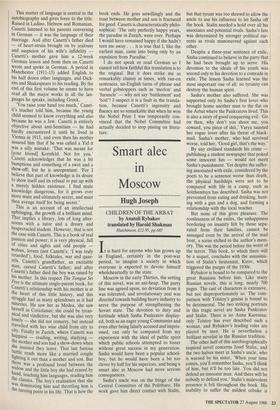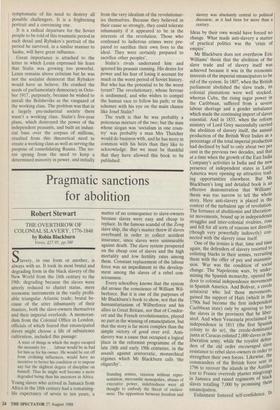Smart alec in Moscow
Hugh Joseph
CHILDREN OF THE ARBAT by Anatoli Rybakov translated by Harold Shukman
Hutchinson, £12.95, pp.685
It is hard for anyone who has grown up in England, certainly in the post-war period, to imagine a society in which everyone is expected to devote himself wholeheartedly to the state.
Moscow in the early Thirties, the setting of this novel, was an ant-heap. The party line was agreed upon, no deviation from it was tolerated, and revolutionary zeal was directed towards building heavy industry to serve the purpose of strengthening the Soviet state. The devotion to duty and fortitude which Sasha Pankratov display- ed, both as an eager young Communist and even after being falsely accused and impris- oned, can only be compared from my experience with the ideal of public spirit which public schools attempted to foster without great success in my generation. Sasha would have been a popular school- boy, but he would have been a bit too clever by half for his superiors, and being a smart alec in Moscow had more serious consequences. Sasha's uncle was on the fringe of the Central Committee of the Politburo. His work gave him direct contact with Stalin, but that tyrant was too shrewd to allow the uncle to use his influence to let Sasha off the hook. Stalin needed a hold over all his associates and potential rivals. Sasha's fate was determined by stronger political cur- rents as rivals manoeuvred against each other.
Despite a three-year sentence of exile, Sasha continued to believe in the party that he had been brought up to serve. His devotion to the ideals of his youth was second only to his devotion to a comrade in exile. The lesson Sasha learned was the most important one of all: no tyranny can destroy the human spirit.
Sasha's mother also suffered. She was supported only by Sasha's first lover who brought home another man to the flat on the Arbat where the Pankratovs lived. This is also a story of good conquering evil. 'Go on then, why don't you shoot me, you coward, you piece of shit,' Varya taunted her rogue lover after his threat of black- mail. Sasha's mother, who had survived worse, told her, 'Good girl, that's the way.'
By any civilised standards his crime — publishing a student newspaper that poked some innocent fun — would not merit Sasha's punishment. Yet despite the suffer- ing associated with exile, considered by the poets to be a sentence worse than death, the physical hardships were not to be compared with life in a camp, such as Solzhenitsyn has described. Sasha was not prevented from eating and drinking, hunt- ing with a gun and a dog, and forming a relationship with the local teacher. But none of this gives pleasure. The rootlessness of the exiles, the unhappiness bordering on insanity felt by those sepa- rated from their families, cannot be assuaged even by the arrival of the mail boat, a scene etched in the author's mem- ory. This was the period before the worst of the terror. This book, to which there will be a sequel, concludes with the assassina- tion of Stalin's lieutenant, Kirov, which triggered the purges of the 1930s. Rybakov is bound to be compared to the great Russians before him. Like many Russian novels, this is long, nearly 700 pages. The cast of characters is extensive, but not disproportionately so. The com- parison with Tolstoy's genius is bound to be detrimental. The two striking portraits in this tragic novel are Sasha Pankratov and Stalin. There is no Anna Karenina: only Tolstoy has ever described such a woman, and Rybakov's leading roles are played by men. He is nevertheless a brilliant novelist in the Russian tradition.
The other half of this autobiographically inspired novel concerns Josef Stalin, and the two halves meet in Sasha's uncle, who is warned by his sister, 'When your time comes, you'll remember Sasha, you'll think of him, but it'll be too late. You did not defend an innocent man. And there will be nobody to defend you.' Stalin's malevolent presence is felt throughout the book. His inability to suffer the mildest rebuke is
symptomatic of his need to destroy all possible challengers. It is a frightening portrait and a convincing one.
It is a radical departure for the Soviet people to be told of this traumatic period in such detail and Rybakov's portrait of the period he survived, in a similar manner to Sasha, will have great influence.
Great importance is attached to the letter in which Lenin expressed his fears that Stalin was growing too powerful. Lenin remains above criticism but he was not the socialist democrat that Rybakov would have us believe. He crushed the seeds of parliamentary democracy in Octo- ber 1917, purposely, because he wished to install the Bolsheviks as the vanguard of the working class. The problem was that in a largely pre-industrial society there wasn't a working class. Stalin's five-year plans, which destroyed the power of the independent peasants, and built an indust- rial base over the corpses of millions, resulted from this theoretical need to create a working class as well as serving the purpose of consolidating Russia. The ter- ror sprang from the need to keep a determined minority in power, and initially from the very idealism of the revolutionar- ies themselves. Because they believed in their cause so strongly, they could tolerate inhumanity if it appeared to be in the interests of the revolution. Those who confessed to ludicrous crimes were pre- pared to sacrifice their own lives to the ideal. They were certainly prepared to sacrifice other peoples'.
Stalin's rivals underrated him and ignored his peasant cunning. His desire for power and his fear of losing it account for much in the worst period of Soviet history. But who has the potential to be the worst tyrant? The revolutionary, whose fervour is undimmed, and who wishes to compel the human race to follow his path; or the schemer with his eye on the main chance like Josef Stalin?
The truth is that he was probably a poisonous mixture of the two; but the man whose slogan was 'socialism in one coun- try' was probably a man Mrs Thatcher would do business with, and he has more in common with his heirs than they like to acknowledge. But we must be thankful that they have allowed this book to be published.















































 Previous page
Previous page